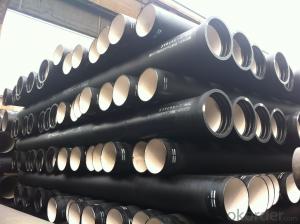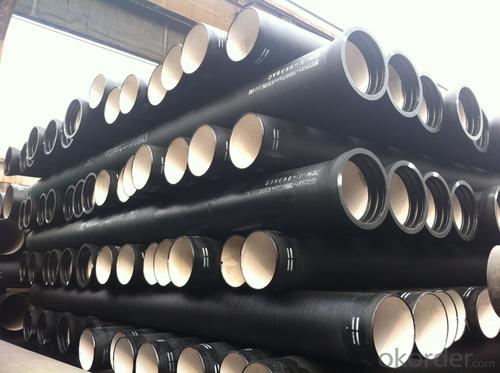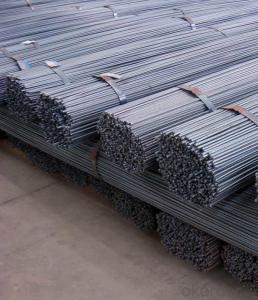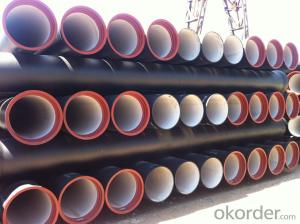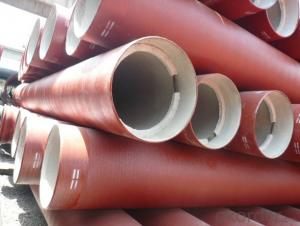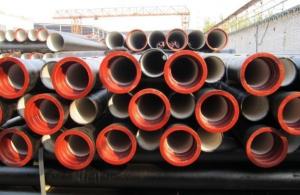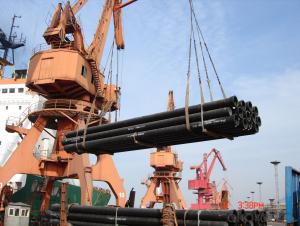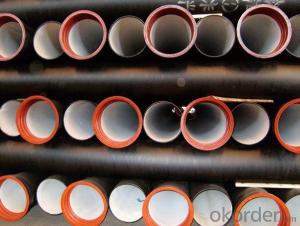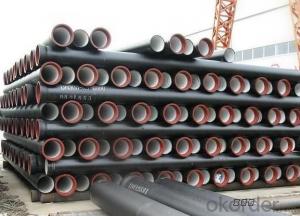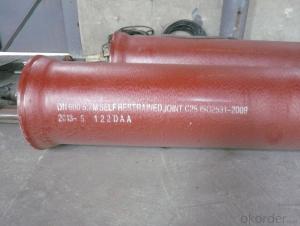Ductile Iron Pipe DN100-DN900 EN545/EN598/ISO2531 C30
- Loading Port:
- China main port
- Payment Terms:
- TT or LC
- Min Order Qty:
- 20 m.t.
- Supply Capability:
- 200000 m.t./month
OKorder Service Pledge
OKorder Financial Service
You Might Also Like
1.Ductile Iron Pipe Description :
DI pipe fittings are manufactured according to ISO 2531 or BS EN545 or BS4772 FOR POTABLE WATER ,internal is cement lining or wet epoxy coating;External is zinc plus bitumen or wet epoxy coating.Pipes confirm to ISO2531,K9 class,T type joint,6m long,with inside cements lining conform to ISO4179, outside Zinc spraying(130g/m2) and bitumen coating(70μm) conform to ISO8179.Pipe ends: Spigot and socket ends, with 100% SBR rubber gaskets accoding to ISO4633.We can do third party inspection according to customer's request.
2.Main Features of the Ductile Iron Pipe:
1. Material: Ductile iron grade 500-7/ 450-10 in accordance with ISO1083
2. Standard: ISO 2531, EN545, EN598, ANSI, AWWA
3. Length: 6m or cut into 5.6m, 5.7m, 5.8m
4. Internal Lining: Cement, conform to ISO4179
5. External coating: Zinc + Bitumen, conform to ISO8179
6. Certificate: ISO9001, ISO14001, SGS, NSF, WRAS
7. Test: In accordance with ISO 2531 / EN 545 / EN598 and 100% water pressure test
3.Ductile Iron Pipe Images:
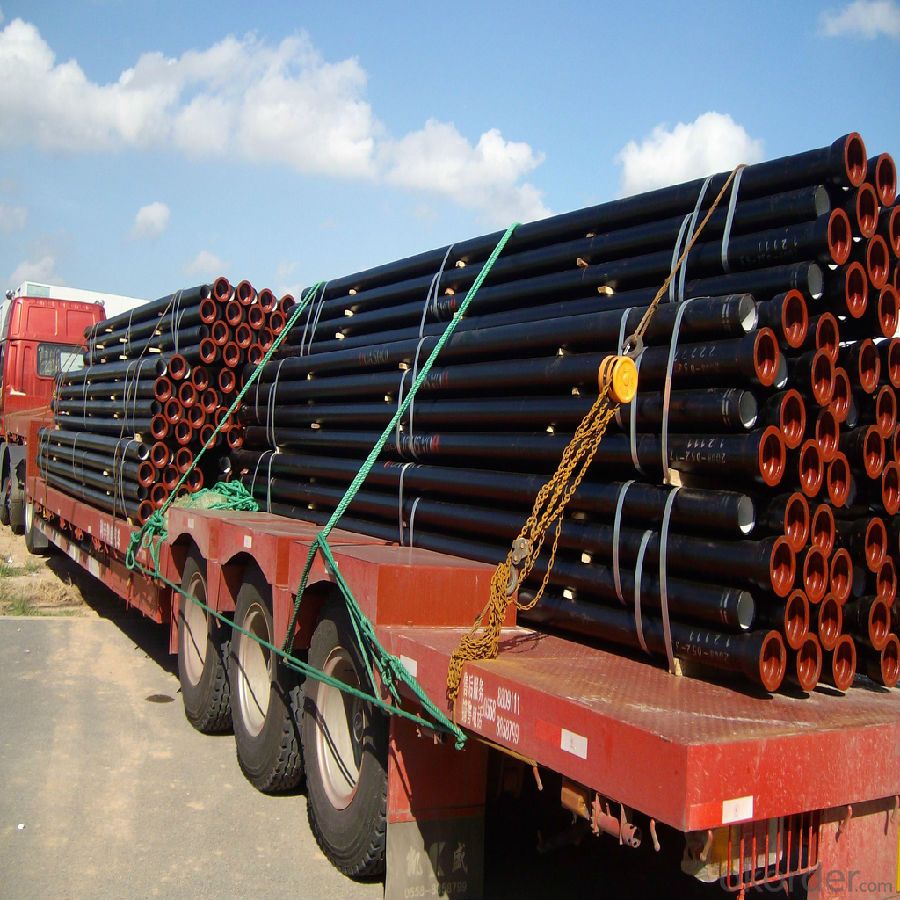
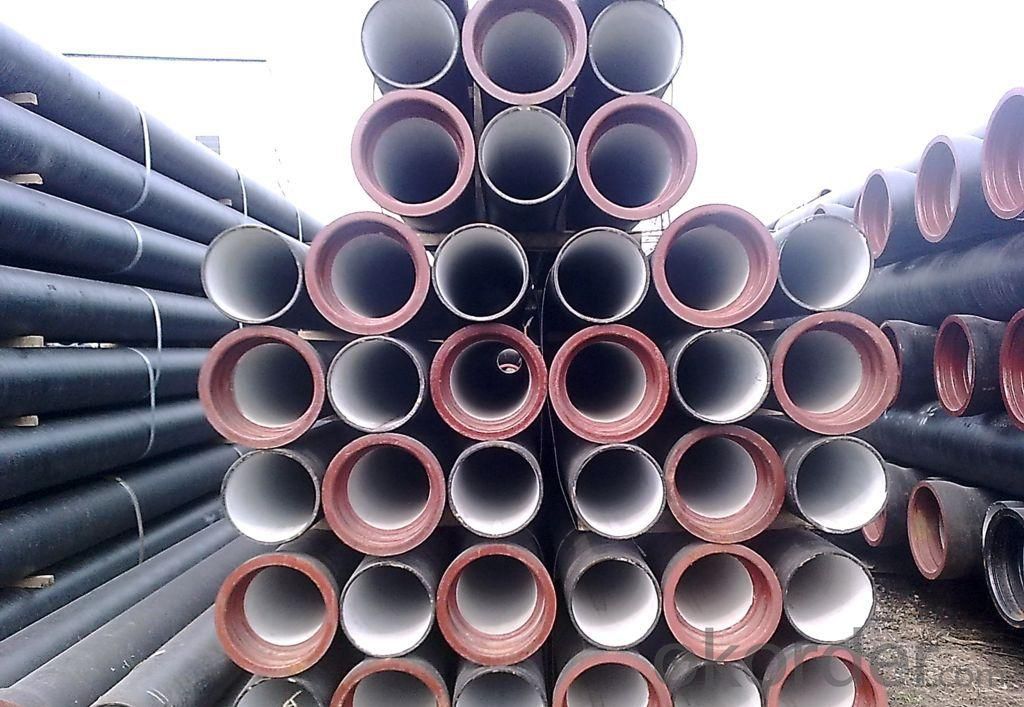
4.Ductile Iron Pipe Specification:
Standard: API SPEC 5L 44th eidtion,ASTM A252-98(2007)
Grade: A53 Grades A/B, ASTM A106 Grades B/C,ASTM A179
AWWA, C200, ASTM A139, ASTM A120, API 5L Grade B
Weld Alternatives: LSAW
OD size range: 6.4~44.5mm
Wall thickness: 406.4~1422mm
5.FAQ:
1.Q:Why can you guarantee the inner of pipes can’t be corroded?
A: High alumina cement mortar lining and sulphate-resistant cement mortar lining. These two special linings are applicable to inner anti-corrosion for sewage pipes, improving resistance to erosion of the sewage components.
2.Q: Why would you choose ductile iron pipe rather than other pipe materials?
A:The reasons are obvious for that not only ductile iron pipe possesses the inherent strength and flexibility of ductile iron, combined with proven corrosion protection systems, but also the cost savings can be achieved from design to installation and commissioning.
- Q: Are ductile iron pipes suitable for high-temperature applications?
- High-temperature applications are generally not suitable for ductile iron pipes. Despite their strength and durability, ductile iron has limitations in high temperatures. Ductile iron pipes usually have a maximum operating temperature of around 250-300 degrees Fahrenheit (120-150 degrees Celsius). When subjected to higher temperatures, ductile iron pipes can undergo thermal expansion, potentially causing cracks or distortions. This can compromise the pipe's structural integrity, leading to leaks or failures. Additionally, ductile iron is vulnerable to oxidation at elevated temperatures, further deteriorating its performance over time. For high-temperature applications, it is generally advisable to opt for materials specifically designed for such conditions, like stainless steel or high-temperature alloys. These materials offer superior resistance against thermal expansion, oxidation, and other factors associated with high temperatures.
- Q: What are the typical pressure surge protection measures for ductile iron pipe?
- There are several typical pressure surge protection measures for ductile iron pipe that help ensure its integrity and longevity. These measures include: 1. Surge tanks: Surge tanks are commonly used to absorb pressure surges and minimize their impact on the ductile iron pipe. These tanks are typically installed at critical points in the pipeline system, such as at pump stations or near valves, to provide a reservoir for excess pressure. 2. Air release valves: Air release valves are essential components in ductile iron pipe systems that help release trapped air and prevent the formation of air pockets. These valves help maintain a stable pressure within the pipe and reduce the risk of pressure surges during operation or sudden changes in flow. 3. Pressure relief valves: Pressure relief valves are designed to protect ductile iron pipes by releasing excess pressure when it exceeds a predetermined threshold. These valves are typically installed at strategic locations in the pipeline system and are set to open when the pressure exceeds a safe limit, diverting the excess pressure to prevent damage to the pipe. 4. Surge suppressors: Surge suppressors are devices that are installed in ductile iron pipe systems to absorb and dissipate pressure surges. These devices act as shock absorbers, reducing the impact of pressure fluctuations and preventing damage to the pipe. Surge suppressors are particularly effective in situations where pressure surges are frequent or severe. 5. Pipe wall thickness: Another crucial measure for pressure surge protection in ductile iron pipe is ensuring an appropriate pipe wall thickness. By selecting a pipe with the correct wall thickness, engineers can ensure that the pipe can withstand the pressure surges it may encounter during operation. This helps prevent pipe failure or rupture due to excessive pressure. It is important to note that the specific pressure surge protection measures implemented for ductile iron pipe may vary depending on the specific application, pipe size, operating conditions, and regulatory requirements. Consulting with experts in pipeline engineering and design is crucial to determine the most suitable pressure surge protection measures for a particular ductile iron pipe system.
- Q: Do ductile iron pipes require special handling during transportation?
- Yes, ductile iron pipes do require special handling during transportation. Ductile iron pipes are known for their strength and durability, but they can be susceptible to damage if not handled properly. These pipes are heavy and can be quite large in size, so it is important to use appropriate lifting and handling equipment during transportation. Special care should be taken to avoid dropping or impacting the pipes, as this can lead to cracks or fractures. Additionally, pipes should be stored and transported in a way that prevents them from rolling or shifting, which could cause damage to the pipe coating or fittings. It is also recommended to protect the pipes from exposure to extreme temperatures or weather conditions during transportation. By following these guidelines and taking the necessary precautions, the risk of damage to ductile iron pipes during transportation can be minimized.
- Q: How do ductile iron pipes handle ground movement in earthquake-prone areas?
- In earthquake-prone areas, ductile iron pipes are highly regarded for their exceptional resistance to ground movement. These pipes are specifically designed to endure external forces, including seismic activities and shifting ground. The remarkable flexibility of ductile iron pipes allows them to effectively absorb and distribute the energy generated during ground movement. This flexibility is achieved through the unique composition of ductile iron, which contains nodular graphite in its microstructure. The presence of nodular graphite grants the pipe with ductility and resilience, enabling it to deform under stress without breaking. During an earthquake, when the ground begins to shift, ductile iron pipes have the capacity to adapt to the changing conditions. They can elongate, compress, and bend, thereby reducing the likelihood of pipe failure. This characteristic is of utmost importance in earthquake-prone areas, as it helps prevent catastrophic failures and water loss that may occur with more rigid pipe materials. Furthermore, ductile iron pipes possess a high level of joint integrity, further enhancing their ability to withstand ground movement during seismic events. The joints of these pipes are engineered to withstand lateral and angular movement, ensuring their integrity and preventing leaks. In addition to their inherent flexibility, ductile iron pipes are often installed using techniques that enhance their resistance to ground movement. Anchoring systems, such as thrust blocks and restraints, can be employed to secure the pipes and prevent excessive movement. These systems contribute to the stability of the pipeline network and further minimize the potential for damage during earthquakes. Overall, the combination of ductility, joint integrity, and anchoring systems make ductile iron pipes an exceedingly reliable choice for managing ground movement in earthquake-prone areas. They offer a durable and resilient solution that can withstand the challenges posed by seismic activities, guaranteeing a continuous water supply and minimizing the risk of infrastructure damage.
- Q: What is the ductile cast iron pipe
- Should not have this conceptI make the ductile iron pipe, haven't heard of this thing only ductile iron pipe, ductile cast iron heard tube
- Q: Are there any specific standards or specifications for ductile iron pipes?
- Yes, there are specific standards and specifications for ductile iron pipes. The most commonly used standards for ductile iron pipes are set by the American Water Works Association (AWWA) and the International Organization for Standardization (ISO). The AWWA standard for ductile iron pipes is known as AWWA C151. This standard covers the design, manufacturing, testing, installation, and maintenance requirements for ductile iron pipes used in water and wastewater applications. It specifies the materials, dimensions, and mechanical properties of the pipes, as well as the required coatings and linings. Similarly, the ISO standard for ductile iron pipes is ISO 2531. This standard provides guidelines for the design, manufacturing, testing, and installation of ductile iron pipes for water and wastewater systems. It covers various aspects such as dimensions, mechanical properties, coatings, and linings. In addition to these two widely recognized standards, there may be other regional or national standards specific to certain countries or regions. These standards often align with the AWWA and ISO standards or may have additional requirements specific to local conditions or regulations. Compliance with these standards ensures that ductile iron pipes meet the necessary quality and performance requirements. It also facilitates the interoperability and compatibility of ductile iron pipes across different systems and countries, enabling reliable and efficient water distribution and wastewater management.
- Q: How are ductile iron pipes tested for hydrostatic pressure?
- Ductile iron pipes are commonly used for water and wastewater applications due to their strength and durability. To ensure the quality and reliability of these pipes, they undergo hydrostatic pressure testing. Hydrostatic pressure testing involves subjecting the ductile iron pipes to internal pressure higher than their normal operating pressure. This is done to assess their ability to withstand the maximum pressure they are expected to encounter during their service life. The testing process typically begins with the selection of a sample set of pipes from a production batch or shipment. These samples are carefully prepared by removing any surface coatings or debris that could affect the accuracy of the test results. Next, the prepared samples are placed within a specially designed test rig or test line. The test rig is equipped with all the necessary connections, valves, and gauges to control and monitor the test conditions accurately. Once the samples are secured in the test rig, water or another suitable test fluid is slowly introduced into the pipes. The pressure is then gradually increased to a predetermined level, typically exceeding the expected operating pressure by a certain factor. This elevated pressure is maintained for a specified duration, usually for several hours, to assess the pipes' structural integrity and leak resistance. During the test, the pipes are closely monitored for any signs of leakage, deformation, or failure. Skilled technicians or engineers observe the pressure gauges and visually inspect the pipes for any visible defects or abnormalities. Additionally, automated systems may be employed to continuously record and analyze the pressure readings, ensuring accurate data collection. After the specified test duration, the pressure is gradually released, and the pipes are carefully inspected for any permanent deformation or residual stress. This inspection may involve visual examination, dimensional measurements, or even non-destructive testing techniques such as ultrasonic testing or magnetic particle inspection. The test results are then evaluated against the relevant industry standards or specifications to determine the pipes' compliance with safety and performance requirements. If the pipes pass the hydrostatic pressure test, they are deemed suitable for their intended application. However, if any issues or failures are identified, further investigation, analysis, or corrective actions may be necessary before the pipes can be approved for use. Overall, hydrostatic pressure testing plays a crucial role in ensuring the quality and reliability of ductile iron pipes. By subjecting these pipes to rigorous testing procedures, manufacturers can provide customers with pipes that meet the highest standards of safety and performance.
- Q: What are the different corrosion protection options for ductile iron pipe?
- There are several corrosion protection options available for ductile iron pipe to ensure its longevity and durability. These options include: 1. Cement Mortar Lining: This involves coating the inner surface of the pipe with a layer of cement mortar, which acts as a barrier between the pipe and corrosive elements in the water or soil. Cement mortar lining provides excellent corrosion resistance and can last for several decades. 2. Polyethylene Encasement: This method involves wrapping the ductile iron pipe with a layer of polyethylene material. The polyethylene acts as a physical barrier, protecting the pipe from external corrosive elements. Polyethylene encasement is commonly used in aggressive soil conditions and can offer long-lasting protection. 3. Internal and External Coatings: Various types of coatings can be applied to the inner and outer surfaces of the ductile iron pipe to provide corrosion resistance. These coatings can be epoxy, polyurethane, or fusion-bonded epoxy (FBE) coatings. These coatings create a barrier between the pipe and the surrounding environment, preventing corrosion. 4. Cathodic Protection: This method involves using an electrical current to protect the pipe from corrosion. Cathodic protection systems can be either galvanic (sacrificial anode) or impressed current systems. These systems direct the flow of electrons to prevent the oxidation of the ductile iron pipe. 5. Zinc Coating: Zinc coating, also known as galvanizing, involves applying a layer of zinc to the surface of the ductile iron pipe. The zinc acts as a sacrificial anode, corroding instead of the iron pipe. Zinc coating provides effective corrosion protection, particularly in soil conditions with low resistivity. It's important to note that the choice of corrosion protection option for ductile iron pipes depends on various factors such as the environment, water chemistry, soil conditions, and expected service life. Consulting with corrosion protection specialists and engineers can help in selecting the most suitable option for specific applications.
- Q: How do ductile iron pipes perform in high-traffic areas?
- Ductile iron pipes perform exceptionally well in high-traffic areas due to their inherent strength and durability. These pipes are manufactured using a unique composition that includes graphite nodules, which give them their characteristic ductility. This ductility allows the pipes to flex and withstand heavy loads and vibrations caused by traffic without cracking or breaking. In high-traffic areas, where the ground is subject to constant movement and heavy loads from vehicles, ductile iron pipes offer superior resistance to stress and impact. Their ability to absorb and distribute the pressure from traffic ensures that these pipes maintain their structural integrity over time. This is particularly important as any damage or failure in a pipe system can result in costly repairs and disruptions to the water supply. Furthermore, ductile iron pipes are highly resistant to corrosion, making them suitable for installation in high-traffic areas exposed to various environmental conditions. The pipes are typically lined with a protective layer, such as cement mortar or epoxy, which provides an additional barrier against external factors. This corrosion resistance ensures the longevity of the pipes, reducing the need for frequent maintenance or replacement. Additionally, ductile iron pipes have excellent flow characteristics, allowing for efficient water distribution even in areas with high traffic demands. Their smooth interior surface minimizes friction and pressure losses, ensuring a consistent and reliable water supply to meet the needs of the surrounding population. Overall, ductile iron pipes are a reliable and robust choice for high-traffic areas. Their strength, durability, corrosion resistance, and efficient flow characteristics make them well-suited for withstanding the demands and challenges posed by heavy traffic, ensuring the continuous supply of water without compromising the structural integrity of the pipe system.
- Q: What are the typical joint restraint systems used in ductile iron pipes?
- The typical joint restraint systems used in ductile iron pipes are mechanical joint restraints, push-on joint restraints, and restrained joint systems. These systems are designed to prevent pipe separation and movement at the joints, ensuring the integrity and stability of the pipeline.
Send your message to us
Ductile Iron Pipe DN100-DN900 EN545/EN598/ISO2531 C30
- Loading Port:
- China main port
- Payment Terms:
- TT or LC
- Min Order Qty:
- 20 m.t.
- Supply Capability:
- 200000 m.t./month
OKorder Service Pledge
OKorder Financial Service
Similar products
Hot products
Hot Searches
Related keywords
